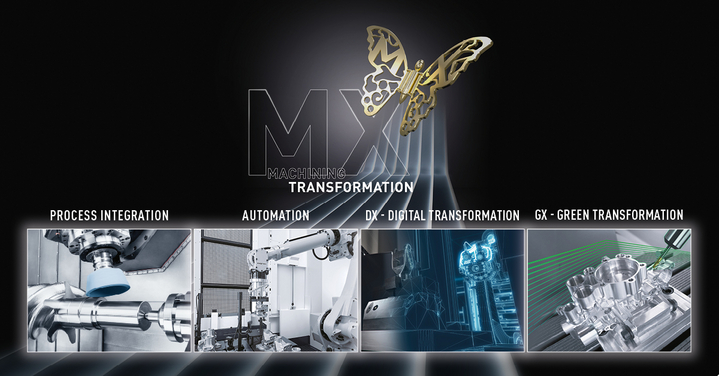Integrative networking for resource-optimized production
CNC manufacturing is a fundamental part of almost every product creation process. Machine tool manufacturers can therefore make a significant contribution to protecting the environment and conserving resources and helping to shape their customers' process chains in a sustainable way. With its Machining Transformation (MX), DMG MORI is pursuing an integrative approach to achieving the Green Transformation (GX).
The importance of sustainability in CNC manufacturing
Sustainability in production means designing processes in such a way that they are ecologically, economically and socially responsible. In line with the ESG concept (Environment, Social, Governance), which has become a central framework for evaluating and managing these aspects worldwide.
High energy consumption and high material usage are the biggest challenges in CNC manufacturing. In CNC manufacturing, energy consumption and the sustainable use of materials are particularly relevant in environmental terms. This provides customers with a significant lever to design their own production processes sustainably from the outset when selecting a machine tool, thereby securing economic and competitive advantages. In addition, the LkSG and the forthcoming CSDD are mandatory legal regulations that affect manufacturers, customers and suppliers alike. These aim to ensure that companies comply with their human rights and environmental due diligence obligations along their entire value chain. Companies must create transparency.
The future of CNC manufacturing will be characterized by sustainable technologies and processes. Companies that focus on this transformation not only secure a competitive advantage, but also make an important contribution to environmental protection. DMG MORI is taking on a pioneering role here and demonstrating how Machining Transformation (MX) holistically combines ecological and economic interests and shapes the future of the manufacturing industry.
Process integration: the foundation of sustainable production

Process integration is one of the four pillars of DMG MORI's Machining Transformation (MX) and is considered a key accelerator of the Green Transformation (GX) in terms of sustainability. The central feature of process integration is to combine several machining steps in a single machine and thus achieve complete machining in a single clamping operation wherever possible. Compared to sequential production on several machining units, this demonstrably reduces energy consumption and also extends the efficient operating times of the machines. Technologies such as 5-axis machining, milling, turning and additive manufacturing or even grinding on a single machine enable companies to make their process chain more sustainable. For example, an aerospace company that manufactures complex titanium components has achieved a 40% reduction in throughput times and a massive reduction in energy consumption by integrating these machining steps.
Automation: Optimizing efficiency and resource utilization
Automation plays a central role in increasing efficiency and conserving resources. DMG MORI offers advanced automation solutions for the loading and unloading of workpieces as well as flexibly automated production cells and production systems. In addition, autonomous transport systems from the AMR series can rationalize the internal handling of raw materials, workpieces, chips and operating materials. By using these technologies, companies can maximize their machine uptime and reduce their reliance on manual labor. Automation solutions also make a significant contribution to reducing energy consumption by optimizing machine operation and minimizing downtime. Another benefit is increased production quality and precision, as human error is reduced and automated systems deliver consistently high quality.
Digital Transformation (DX) for data-based sustainability
Digital transformation, another central component of DMG MORI's Machining Transformation (MX), enables data-driven optimization of the machining process chain. Technologies such as the digital twin of machines, digital twin test cuts, efficient CAM systems and real-time monitoring improve transparency in production and help to use energy more efficiently and minimize waste.
With the introduction of CELOS X, DMG MORI offers a digital ecosystem that creates a seamless connection between machines and company IT. This not only paves the way for predictive maintenance and the optimization of manufacturing processes and workflows, but also helps to reduce energy consumption, as potential errors and inefficient processes can be identified and improved at an early stage. The digital transparency of processes therefore helps companies to increase energy efficiency and reduce CO2 emissions.
Green transformation (GX): Sustainability as a central goal
The Green Transformation (GX) is an integrative approach that covers the entire production chain - from material procurement and the production process through to the disposal and recycling of machines. By using energy-efficient measures, such as those bundled in DMG MORI's GREENMODE package, companies can reduce the energy consumption of their DMG MORI machines by more than 30 percent.
The examples show how comprehensively and profoundly DMG MORI supports its customers on the way to more sustainable production: with customized solutions that combine process integration, automation, Digital Transformation (DX) and Green Transformation (GX). The company not only offers the machines and technologies, but also provides support with comprehensive consulting and services to ensure efficient and sustainable production. DMG MORI also offers programs for the reuse and recycling of machines to ensure that sustainability is also guaranteed at the end of the machine life cycle.
The future of CNC manufacturing in terms of sustainability
Sustainability is no longer just an option in CNC manufacturing, but a necessity. DMG MORI is setting new standards in manufacturing with its Machining Transformation (MX), in particular through the Green Transformation (GX). The combination of process integration, automation and Digital Transformation (DX) not only makes production more efficient, but also more resource-efficient and environmentally friendly. Companies that rely on these technologies and strategies are not only able to reduce their costs and increase productivity, but also make a significant contribution to reducing the global carbon footprint.
DMG MORI impressively demonstrates how economic interests and ecological responsibility can be reconciled. The implementation of automated and digital solutions makes it possible to make manufacturing processes more flexible, efficient and sustainable. Through packages of measures such as GREENMODE and the comprehensive use of digital ecosystems such as CELOS X, DMG MORI offers a holistic approach to optimizing production that meets both the requirements of today and the challenges of the future.